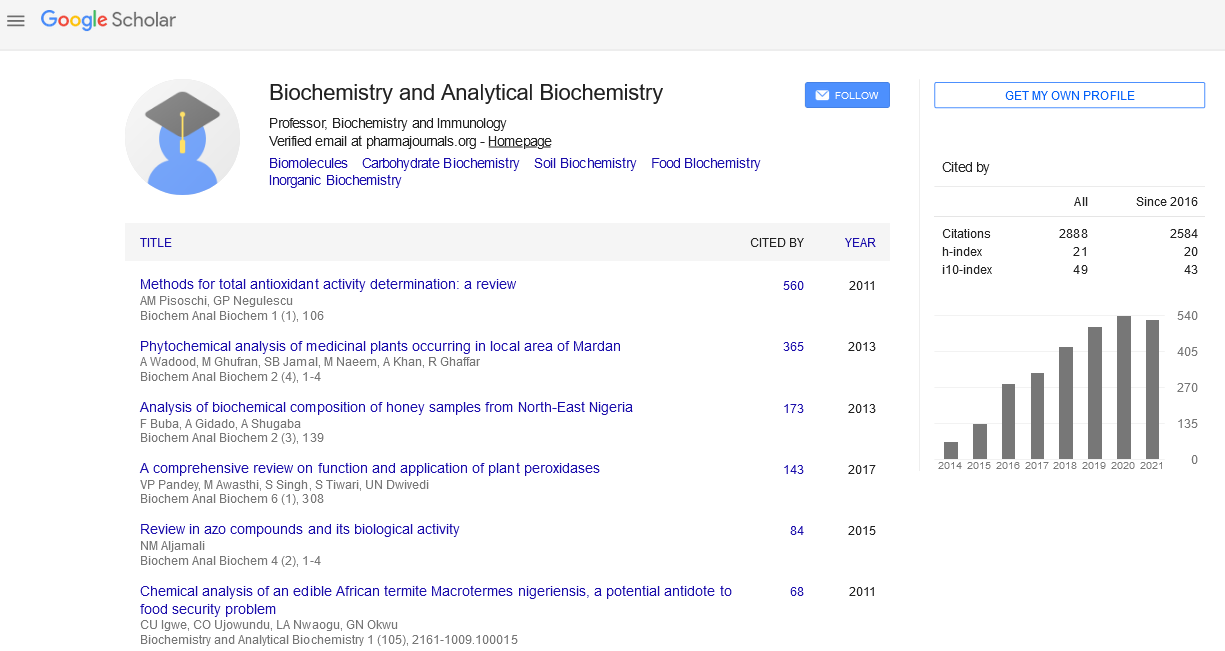Indexed In
- Open J Gate
- Genamics JournalSeek
- ResearchBible
- RefSeek
- Directory of Research Journal Indexing (DRJI)
- Hamdard University
- EBSCO A-Z
- OCLC- WorldCat
- Scholarsteer
- Publons
- MIAR
- Euro Pub
- Google Scholar
Useful Links
Share This Page
Journal Flyer

Open Access Journals
- Agri and Aquaculture
- Biochemistry
- Bioinformatics & Systems Biology
- Business & Management
- Chemistry
- Clinical Sciences
- Engineering
- Food & Nutrition
- General Science
- Genetics & Molecular Biology
- Immunology & Microbiology
- Medical Sciences
- Neuroscience & Psychology
- Nursing & Health Care
- Pharmaceutical Sciences
Development of smart vectors for enhanced cytoplasmic delivery of therapeutic nucleic acids
International Conference and Exhibition on Biochemical & Molecular Engineering
October 07-08, 2013 Hilton San Antonio Airport, TX, USA
Mohamed E. H. ElSayed
Accepted Abstracts: Biochem Anal Biochem
Abstract:
Plasmid DNA, antisense oligodeoxynucleotides, and silencing RNA molecules have displayed therapeutic activity against cancer, viral infection, cardiovascular diseases, and neurodegenerative disorders in preclinical models. However, development of these nucleic acids into clinically-viable treatments has been hampered by the lack of an efficient carrier that can deliver this DNA/RNA cargo selectively into the cytoplasm of the diseased cell without exhibiting non-specific toxicity to healthy tissues. This talk will describe our efforts to design and synthesize a new family of star-shaped pH-sensitive polymers, which proved effective in condensing a large dose of silencing RNA (siRNA) molecules forming smart particles that efficiently shuttled their cargo into the cytoplasm of epithelial cancer cells to successfully suppress the expression of targeted genes.
Biography :
Mohamed E. H. ElSayed received his BS of Pharmacy & Pharmaceutical Chemistry from Cairo University in May 1994. In July 2002, he obtained Ph.D. in Pharmaceutical Sciences from the University of Maryland where he investigated the effect of the physicochemical properties of dendritic carriers on their transport across epithelial and endothelial barriers under the supervision of Professor Hamidreza Ghandehari. Soon after his graduation, he joined the University of Washington, Department of Bioengineering to work with Professors Allan Hoffman and Patrick Stayton on the development of pH-sensitive polymeric carriers for delivery of therapeutic nucleic acids into epithelial cancer cells for treatment of breast cancer. In January 2007, he joined the Department of Biomedical Engineering at the University of Michigan where he has established the Cellular Engineering and Nano-Therapeutics Laboratory. His research program utilizes a multidisciplinary approach to develop bio-inspired drug delivery systems that enhance the therapeutic activity of the incorporated drug molecules while eliminating or minimizing their potential side effects with particular emphasis on rational design and synthesis of novel biomaterials for drug and gene delivery, bio-nanotechnology, and smart therapeutics. He received several honors and awards including the National Cancer Center Fellowship, Susan G. Komen Postdoctoral Fellowship, US Department of Defense Award, US National Science Foundation CAREER Award, and Coulter Foundation Translational Research Partnership in Biomedical Engineering Award.


